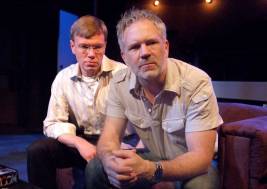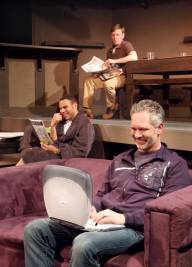
Actor-playwright Dan Via puts an intriguing new spin on the romantic triangle—and the often blurred line between friendship and romance—in the highly provocative Daddy, now getting an impressive West Coast Premiere under the skilled, nuanced direction of Rick Sparks.
Via shares the stage with Gerald McCullouch (of TV’s CSI) as a pair of longtime 40something best friends whose relationship resembles nothing more than a decades-married couple (minus whatever sex a decades-married couple might still be having). Nerdy, bespectacled Carnegie-Mellon professor Stewart Wisniewski (Via) and silver-fox sexy Pittsburgh newspaper columnist Colin McCormack (McCullouch) may not share domestic digs, but Stew seems to be at Colin’s apartment more often than his own, the duo frequently plunked down on Colin’s sofa watching the Pirates while munching on Chinese takeout or the Sunday breakfast Stew is in the habit of cooking for the two of them.
The fact that the former college roommates did some fooling around during their undergrad years seems irrelevant to their current friendship, though an outside observer might wonder if Stew may not in his heart of hearts wish for more. Then again, perhaps he’s merely envying the middle-aged sex appeal that comes so effortlessly for Colin and makes it easy for the self-described “slut” to trick with his otherwise straight soccer teammates, or to garner most of the attention whenever the two friends go barhopping.
It’s on one of these bar nights that Thaddeus (Ian Verdun), a hunky 21-year-old African American with a honey of a North Carolina drawl, approaches Colin with all the wide-eyed adoration of a teenage girl suddenly finding herself face to face with Justin Bieber. Tee, as Thaddeus calls himself, turns out to be an intern at Colin’s newspaper and columnist Colin’s biggest fan. The older man is naturally flattered by the attention Tee is bestowing on him. Who wouldn’t be? As for Stew, he’s as invisible to Tee as he’s likely been to any of the countless men who’ve had their eye set on Colin over the years and been oblivious to the man at his side.
Still, if not for Tee’s persistence, whatever attraction Colin may have felt for the younger man at their first meeting might have led nowhere, there being the matter of Tee’s internship at Colin’s paper to consider, and the fact that Colin has never particularly fancied men young enough to be his son. Tee does persist, though, so much so that Colin eventually plants a kiss on his lips, a kiss that is initially, curiously resisted, but then responded to with unfeigned passion.
Colin and Tee’s ensuing affair not only blurs the lines of professional ethics (though, as Colin points out, Tee isn’t Colin’s intern per se), it generates a rivalry between Tee and Stew for the lion’s share of Colin’s time and attention, Stew continuing to treat Colin’s apartment as his home away from home, Tee complaining vociferously about Stew’s near constant presence in their midst. When Stew is offered a more prestigious teaching post at Stanford, Tee sees this as a heaven-sent way to keep the best friends a continent apart. Stew, on the other hand, considers it his his duty to protect his best friend from Tee’s excessive interest in Colin’s family relations and his past, and he begins his own background check on the mysterious, and possibly dangerous young man.
To reveal anything more about Daddy’s plot would be criminal, though some have done so. Suffice it to say that this reviewer was taken places he hadn’t expected to visit, and kept ever further on the edge of his seat as secrets were revealed and relationships tested to the breaking point. If ever a play cried out for talk-back performances, Daddy is that play. Believe me, there is much to talk about.
McCullouch and Via performed the same roles in New York about a year ago, and a glance at those reviews suggests that the Los Angeles production surpasses its World Premiere in more ways than one—further evidence that our L.A. stage scene plays second fiddle to none.
Producer Racquel Lehrman and associate producer Keirin Brown (of Theatre Planners) could not have made a savvier move than to get Rick Sparks on the Daddy team. A director best known for helming comedies and musicals, Sparks gives Daddy a brisk pace and light-handed touch that both keeps the action moving lickety-split and avoids turning drama into melodrama.
Another stroke of genius was hiring Adam Flemming to design Daddy’s stylish dual-level set, one that transforms almost instantly from bar to living room to office to dining room, thereby eliminating the lengthy scene changes New York reviewers complained about almost to a person.
Other design elements are equally stellar, from Francois-Pierre Couture’s expressive lighting, to Sharell Martin’s character-perfect costumes, to Joseph “Sloe” Slawinski’s suspense-building sound design, the latter working beautifully in tandem with Pietor Angell’s original music.
Still, a play like Daddy succeeds or fails, not on its design, or even its direction, but on the cast that performs it, and here too Daddy simply could not be better.
McCullouch, one of OUT magazine’s “100 most compelling people of 2010,” is the very definition of 40plus sexiness, making the attentions of a man half his age not only understandable but downright inevitable. McCullouch does work so natural, so unforced, so thoroughly real that it becomes the best kind of acting—the invisible kind, and I’d venture to guess that, Ramin Setoodeh be damned, McCullouch could generate equal sparks opposite a female costar as he does opposite Verdun.
Via has written himself a part that many in the audience will easily identify with, the invisible older man with so much to give and so little appreciation for what he has to offer—and he plays this loving/envious/jealous best friend to perfection.
New to the L.A. production is Cal Arts grad Verdun, sure to be one of the brightest stage discoveries of 2011. Oozing Southern charm bolstered by a spunky youthful sex appeal and tempered by a touching vulnerability, Verdun more than holds his own against his more seasoned costars, and you are made of tougher stuff than I if Tee’s more dramatic moments don’t bring tears to your eyes.
Completing the cast in mostly nonspeaking roles are Jeffrey Patrick Olson, Nik Roybal, and Rene Ruiz, aiding greatly in creating the world in which the three principals live their lives.
John Ryman is assistant lighting designer, Mike Mahaffey fight choreographer, Kiff Scholl graphic designer, Angelica Estevez production stage manager, and Roybal assistant stage manager.
Press releases for Daddy have described it as an exploration of “the hot-button issue of gay marriage,” and while same-sex marriage does indeed get discussed at various times and an anti-gay marriage rally does provoke one of Daddy’s pivotal moments, Via’s play is not about gay marriage. What it is about is the complexity of human relationships, whether romantic, platonic, familial, sexual, or any combination of the above. However you define it, Daddy is one terrific play and this is one terrific production.
Hudson Mainstage, 6539 Santa Monica Blvd., Hollywood.
www.plays411.com/daddy
–Steven Stanley
January 9, 2011
Photos: Ed Krieger





 Since 2007, Steven Stanley's StageSceneLA.com has spotlighted the best in Southern California theater via reviews, interviews, and its annual StageSceneLA Scenies.
Since 2007, Steven Stanley's StageSceneLA.com has spotlighted the best in Southern California theater via reviews, interviews, and its annual StageSceneLA Scenies.







 COPYRIGHT 2024 STEVEN STANLEY :: DESIGN BY
COPYRIGHT 2024 STEVEN STANLEY :: DESIGN BY